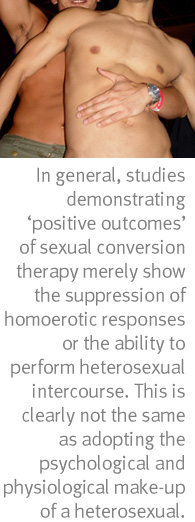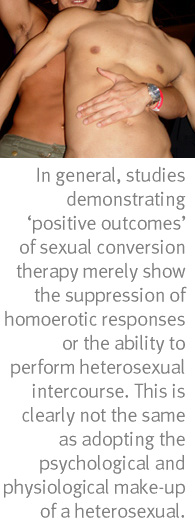PM Goh's remarks in his TIME magazine interview last year sparked a widespread, never-seen-before social debate on all things pink and gay, drawing comments from out homosexuals, politicians, journalists, psychologists, businessmen, religious bodies to the man-on-the-street.
In The Pink takes stock of the biomedical science behind the psyche, and ploughed review articles to distil the facts behind some of the key issues and assumptions in the still simmering debate...

The Biologic Theories. The history of research on a biological basis for homosexuality has been short, and pretty much happened within the last four decades.
Genetic linkage studies done on identical (monozygotic) versus non-identical (dizygotic) twins, and twins reared apart, seemed to suggest some degree of genetic explanation for homosexuality behaviour that is located on the X chromosome. However, it has been difficult to tease apart the contributions of environmental and genetic factors in many of the studies so far.
Initial studies on prenatal hormonal balance in rat models and sexual behaviour were subsequently believed not to be applicable to humans, whose sexual behaviour was far more complex. Studies looking at the relationship between prenatal hormonal influences during gestation and sexual orientation in humans were also confounded by the effects of social upbringing and cultural biases. There is no increased incidence of homosexuality in males with syndromes involving prenatal insufficiency, or in females affected with syndromes with androgen excess. Furthermore, sensitive hormonal assays have failed to show any correlation between sexual orientation and adult hormonal levels, therapy with hormonal agents have not influenced sexual orientation and there are no known neurochemical differences between homosexual and heterosexual brains.
Studies investigating the relationship of brain structure, such as the highly publicised study by LeVay (1991) found that a region of the hypothalamus (a key area in the brain governing behaviour and hormonal functioning) in homosexual men was smaller than that in heterosexual men. However, critics have argued that the small numbers of men studied, many of whom had coincident HIV infection, and non-reproducibility of the results obtained make the findings ungeneralisable.
Not Purely Biological. There are prominent reasons underlying the theories of biologic explanations of homosexuality - first humans are essentially mammals which have similar sex-related behaviour brain regions; childhood gender non-conformity appears so early in development that it must be inborn; the resistance of sexual orientation to change; and scientists have not been satisfied with the psychosocial explanations thus far. Though it may be tantalising, and even convenient, to think that homosexuality is purely determined by nature, reality isn't so straightforward. We know that gender identity is established by three years of age (through sexual assignment and social upbringing); however, gender constancy develops later, largely due to environmental factors. One plausible explanation is that biology sets the stage and defines the timeframe for social experiences that shape sexual orientation, perhaps in as early as the first four years of life.

Does one choose to be gay?
Not A Choice But A Complex Process. It is well-established that by adolescence, some individuals develop a predominantly or exclusively homosexual orientation. It is not uncommon for these individuals to develop and culminate into positive gay and lesbian identity and self-acceptance. Psychologists who have conducted projective tests found similar high levels of adjustment in both homosexual as well as heterosexual individuals. Rather than being a simplistic 'conscious lifestyle choice,' the weight of evidence seems to favour the argument that homosexuality is the end-point of a complex developmental process, that is not uncommonly associated with a sense of psychological well-being.
The Sexual Spectrum. One of the most provocative findings of the landmark 1948 Kinsey studies was that there was a spectrum of sexual behaviour. The studies reported that four percent of American males were exclusively homosexual, 10 percent had been practicing homosexuals for more than three years' of their lives, and 27 percent had some homosexual experience. Though the Kinsey studies were thought not to be representative, other estimates of the prevalence of homosexual behaviour correlated quite well and ranged from two to six percent in men and around three percent in women. These figures are actually thought to be under-reported because of the social stigma associated with homosexual behaviour.
Clearly, sexual behaviour is more fluid and complex than convenient labels of 'heterosexuality' or 'homosexuality,' with suggested simplistic originations by birth or choice. Furthermore there are still unanswered questions around the relationship between sexual behaviour and sexual identity.
Not A Mental Illness. Perhaps the only thing that can be said definitively is that the medical view of homosexuality has evolved over time - it is no longer seen as a disease today. In 1986, homosexuality was removed entirely from the Diagnostic and Statistical Manual of Mental Disorders of the American Psychiatric Association. In 1992, the World Health Organisation removed homosexuality from the 10th Edition of the International Classification of Diseases.
Can homosexuals change?
No Evidence That Sexual Conversion Works. In general, studies demonstrating 'positive outcomes' of sexual conversion therapy merely show the suppression of homoerotic responses or the ability to perform heterosexual intercourse. This is clearly not the same as adopting the psychological and physiological make-up of a heterosexual. Studies documenting changes in sexual orientation have also lacked rigor and there has been no long-term data to show conclusively the cause-and-effect relationship of therapy. Indeed, earlier studies that subject individuals to electric shocks or nausea-inducing drugs while showing them homoerotic stimuli are ethically questionable. Furthermore, some of these 'studies' are also the product of anti-gay activists.
Positive Therapy. The mainstream view today is that individuals who are troubled about their orientation have internalised society's prejudices against homosexuality. It has been proposed that the appropriate therapy is actually to help them overcome these feelings and to counsel them to lead a positive life as a gay man or lesbian.
Last Words
There is a general lack of interest in recent years among biomedical scientists in the field of homosexuality indicates that that researchers have moved on from trying to prove or disprove a unitarian biomedical explanation for homosexuality.
What science has been able to tell us is that homosexuality is the end result of a complex developmental process that is part gene-driven, part environmental. Far from being a straightforward, simplistic
behavioral choice, homosexuality is the culmination of this process, which has been found to be associated with a sense of psychological well-being. Homosexuality is not a disease, and individuals should learn to come to terms with their orientation and strive to lead positive lives.
In The Pink is a Singapore-based non-profit network of health-care professionals offering medical, health and lifestyle advice for men who have sex with men (MSM).











 列印版本
列印版本


















讀者回應
搶先發表第一個回應吧!
請先登入再使用此功能。